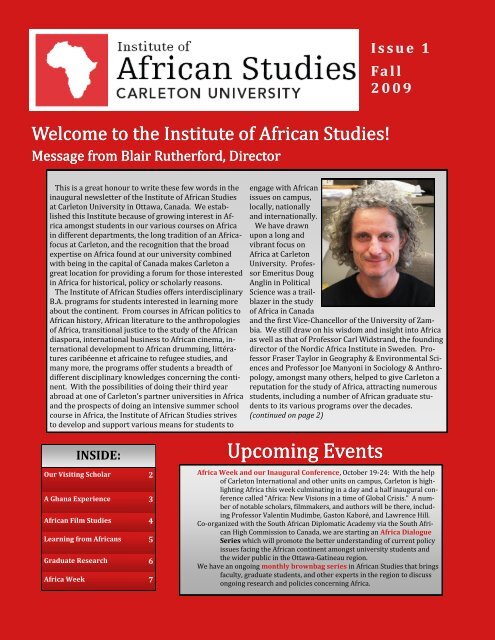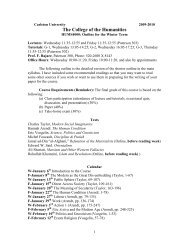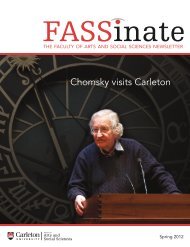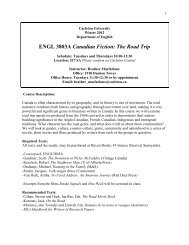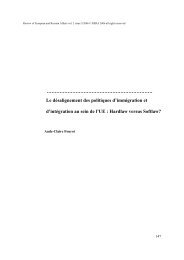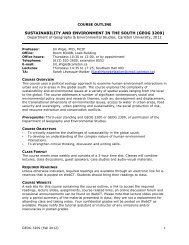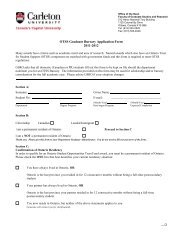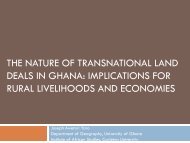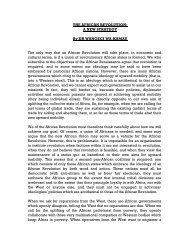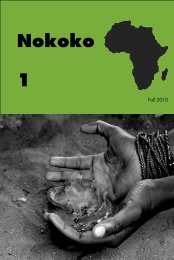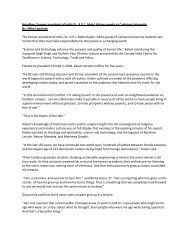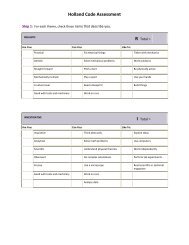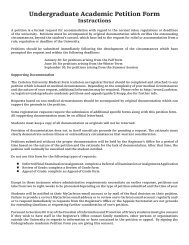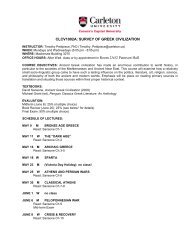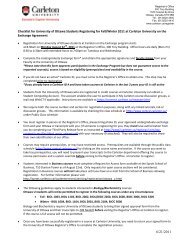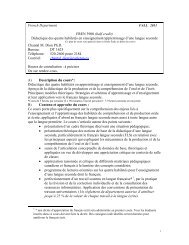Fall 2009 - Carleton University
Fall 2009 - Carleton University
Fall 2009 - Carleton University
You also want an ePaper? Increase the reach of your titles
YUMPU automatically turns print PDFs into web optimized ePapers that Google loves.
Fa l l<br />
<strong>2009</strong><br />
Welcome to the Institute of African Studies!<br />
Message from Blair Rutherford, Director<br />
I s s u e 1<br />
This is a great honour to write these few words in the<br />
inaugural newsletter of the Institute of African Studies<br />
at <strong>Carleton</strong> <strong>University</strong> in Ottawa, Canada. We established<br />
this Institute because of growing interest in Africa<br />
amongst students in our various courses on Africa<br />
in different departments, the long tradition of an Africafocus<br />
at <strong>Carleton</strong>, and the recognition that the broad<br />
expertise on Africa found at our university combined<br />
with being in the capital of Canada makes <strong>Carleton</strong> a<br />
great location for providing a forum for those interested<br />
in Africa for historical, policy or scholarly reasons.<br />
The Institute of African Studies offers interdisciplinary<br />
B.A. programs for students interested in learning more<br />
about the continent. From courses in African politics to<br />
African history, African literature to the anthropologies<br />
of Africa, transitional justice to the study of the African<br />
diaspora, international business to African cinema, international<br />
development to African drumming, littératures<br />
caribéenne et africaine to refugee studies, and<br />
many more, the programs offer students a breadth of<br />
different disciplinary knowledges concerning the continent.<br />
With the possibilities of doing their third year<br />
abroad at one of <strong>Carleton</strong>’s partner universities in Africa<br />
and the prospects of doing an intensive summer school<br />
course in Africa, the Institute of African Studies strives<br />
to develop and support various means for students to<br />
INSIDE:<br />
Our Visiting Scholar 2<br />
A Ghana Experience 3<br />
African Film Studies 4<br />
Learning from Africans 5<br />
Graduate Research 6<br />
Africa Week 7<br />
engage with African<br />
issues on campus,<br />
locally, nationally<br />
and internationally.<br />
We have drawn<br />
upon a long and<br />
vibrant focus on<br />
Africa at <strong>Carleton</strong><br />
<strong>University</strong>. Professor<br />
Emeritus Doug<br />
Anglin in Political<br />
Science was a trailblazer<br />
in the study<br />
of Africa in Canada<br />
and the first Vice-Chancellor of the <strong>University</strong> of Zambia.<br />
We still draw on his wisdom and insight into Africa<br />
as well as that of Professor Carl Widstrand, the founding<br />
director of the Nordic Africa Institute in Sweden. Professor<br />
Fraser Taylor in Geography & Environmental Sciences<br />
and Professor Joe Manyoni in Sociology & Anthropology,<br />
amongst many others, helped to give <strong>Carleton</strong> a<br />
reputation for the study of Africa, attracting numerous<br />
students, including a number of African graduate students<br />
to its various programs over the decades.<br />
(continued on page 2)<br />
Upcoming Events<br />
Africa Week and our Inaugural Conference, October 19-24: With the help<br />
of <strong>Carleton</strong> International and other units on campus, <strong>Carleton</strong> is highlighting<br />
Africa this week culminating in a day and a half inaugural conference<br />
called “Africa: New Visions in a time of Global Crisis.” A number<br />
of notable scholars, filmmakers, and authors will be there, including<br />
Professor Valentin Mudimbe, Gaston Kaboré, and Lawrence Hill.<br />
Co-organized with the South African Diplomatic Academy via the South African<br />
High Commission to Canada, we are starting an Africa Dialogue<br />
Series which will promote the better understanding of current policy<br />
issues facing the African continent amongst university students and<br />
the wider public in the Ottawa-Gatineau region.<br />
We have an ongoing monthly brownbag series in African Studies that brings<br />
faculty, graduate students, and other experts in the region to discuss<br />
ongoing research and policies concerning Africa.
P a g e 2<br />
Sackey speaks on Africa’s contribution to literature<br />
Dr. Edward Sackey, a lecturer in the English Department<br />
of <strong>University</strong> of Legon, Ghana, begins his tenure as<br />
the visiting scholar for the year <strong>2009</strong>/2010 at the Institute<br />
of African Studies. Sackey was chosen among three<br />
candidates shortlisted<br />
for the position in<br />
Ghana and became the<br />
second visiting scholar<br />
from the country since<br />
<strong>Carleton</strong> <strong>University</strong><br />
started the exchange<br />
program with some<br />
universities in Africa.<br />
Sackey was born and<br />
educated in Ghana. He<br />
holds a BA in Literature-in-English<br />
and an<br />
MPhil in 20th Century British Literature and African Literature,<br />
both from the <strong>University</strong> of Ghana. He obtained a<br />
PhD in American and Caribbean Literatures and Literary<br />
Theory from Miami <strong>University</strong>, in the United States and<br />
teaches in his alma mater. His areas of interest are in Literary<br />
Theory, the Novel Form, African Literature and the<br />
Literatures of the African Diaspora.<br />
During the academic year, Sackey will be teaching in<br />
both the English Department and the Institute of African<br />
Studies. He will also hold public lectures on African literature,<br />
but will spend most of his time conducting research,<br />
which will form the basis of his forthcoming book<br />
on Africa’s contribution to the literary form. He says the<br />
research idea is an answer to the current debate among<br />
western scholars on the contribution of African writers<br />
to the novel form. (continued on page 3)<br />
(continued from page 1) As different units on campus<br />
kept hiring professors working on Africa, a group of faculty<br />
members started to consolidate our efforts and began<br />
to work towards setting up this Institute. Sadly, one<br />
of the main proponents of establishing the Institute of<br />
African Studies, Professor Edward Osei Kwadwo Prempeh,<br />
is not here to see it come to fruition.<br />
We have over forty <strong>Carleton</strong> professors crossappointed<br />
to our Institute, making our university having<br />
one of the largest concentrations of Africanist scholars of<br />
any Canadian university. The Institute of African Studies<br />
aims to build upon this existing strength. It will also play<br />
to <strong>Carleton</strong>’s “Ottawa advantage,” as the city is home to a<br />
large number of Africa-focused governmental and nongovernmental<br />
organizations, all of the African embassies<br />
and high commissions, and other universities with numerous<br />
scholars working on Africa. We aim to work<br />
with this diverse range of experts to put on public talks<br />
and conferences, think through policy and program issues,<br />
and to help elevate the scholarly discussion and<br />
public knowledge of Africa.<br />
In this inaugural issue, we will introduce you to some of<br />
the people and activities involved in African Studies at<br />
<strong>Carleton</strong>. We are pleased to introduce you to Professor<br />
Ed Sackey, our Visiting Scholar from the <strong>University</strong> of<br />
Ghana. Professor Sackey is our fourth African Visiting<br />
Scholar, following Professors Amos Mhina and Sam<br />
Maghimbi from the <strong>University</strong> of Dar es Salaam, and Professor<br />
Abeeku Essuman-Johnson also from the <strong>University</strong><br />
of Ghana. They have brought their great insight, rich experience,<br />
and vitality to our students and our colleagues<br />
on campus, helping to concretize <strong>Carleton</strong>’s relationships<br />
with African institutions. We also will introduce you to<br />
two faculty members, something which we will do with<br />
each biannual issue of the newsletter. Although the Institute<br />
of African Studies currently does not have a graduate<br />
program, <strong>Carleton</strong> has a number of students doing<br />
exciting graduate research on Africa in various other<br />
units. We are pleased to also introduce you to some of<br />
the currently enrolled or recently graduated graduate<br />
students and their work. These brief sketches will help<br />
indicate some<br />
of the important<br />
scholarly<br />
work on Africa<br />
being accomplished<br />
at<br />
<strong>Carleton</strong>.<br />
“The IAS aims to<br />
build upon <strong>Carleton</strong>’s<br />
existing strength.”<br />
Finally, it is important to acknowledge the immense<br />
work being done by numerous people to make the Institute<br />
flourish. Innumerable colleagues have been putting<br />
much, much time into our various activities while June<br />
Payne, our administrator, has been ensuring everything<br />
flows smoothly and actually gets done. A number of students<br />
have volunteered, bringing their energy and insight<br />
into our collective efforts. This is illustrated by this<br />
newsletter itself, where most of it has been done by two<br />
students in <strong>Carleton</strong>’s School of Journalism and Communication,<br />
where thanks largely to the efforts by Professor<br />
Allan Thompson, there is a strong focus on Africa, particularly<br />
through the Rwanda Initiative. Many thanks to<br />
Ebere Ahanihu and Harmeet Singh, whose skills and hard<br />
-work have made this newsletter come together. This is<br />
but a small example of the convergence of energy and<br />
expertise which the Institute of African Studies seeks to<br />
channel in bringing the study of Africa to diverse publics<br />
at <strong>Carleton</strong> <strong>University</strong>, in Ottawa, and beyond.
P a g e 3<br />
‘Ghana enriched my knowledge about Africa’<br />
The African Studies program at<br />
<strong>Carleton</strong> <strong>University</strong> is the perfect<br />
program for me because my main<br />
interest lies in learning about African;<br />
the culture, people, and history.<br />
For some reason, Africa has always<br />
caught my attention. At the end of<br />
my studies, my goal is to work in the<br />
continent, whether it is through an<br />
international organization or with a<br />
governmental organization.<br />
I developed interest in Africa<br />
when at High School, when I began<br />
to meet African students. Their culture<br />
and family life intrigued me. I<br />
loved their love for life. Their life’s<br />
stories were so enchanting and different<br />
from those of Canadians.<br />
Meeting Africans, who have different<br />
cultures and traditions, was fun and<br />
an eye-opening experience for me.<br />
Since then, I have been interested in<br />
learning more about this unique<br />
continent and its people.<br />
The African Studies program<br />
helped me to develop a strong<br />
knowledge about the continent<br />
through the wide variety of courses<br />
offered. The good thing is that the<br />
program has a variety of courses<br />
from music, literature, politics, film,<br />
religion and history. As I am more<br />
interested in the humanitarian and<br />
development issues, I intend to take<br />
more of the history and political science<br />
courses.<br />
The program also offers opportunities<br />
to study abroad at one of its<br />
three partner universities in Africa,<br />
as well as a placement course which<br />
allows students to find jobs with<br />
international organizations, nongovernmental<br />
organizations or governmental<br />
departments that work in<br />
African countries, and gain experience<br />
in the work field, while still<br />
obtaining a grade mark for doing so.<br />
(continued from page 2) “There is<br />
a debate on-going, that the novel<br />
form, as an art, is alien to Africa,” he<br />
says. “In the book, I am trying to say<br />
that the debate is not helpful, because<br />
there are recognised African<br />
novelists who are writing and will<br />
continue to write.” The question, in<br />
his opinion, should be whether African<br />
novelists have contributed anything<br />
or nothing. “What we must be<br />
doing is to<br />
recognise<br />
African<br />
novels,<br />
read them<br />
and see<br />
what the<br />
writers<br />
have<br />
brought to<br />
the novel<br />
form.”<br />
In the<br />
The question should<br />
be whether African<br />
novelists have contributed<br />
anything or noth-<br />
ing.<br />
views of Sackey, one has to go back<br />
in history to understand why this<br />
argument is being made. “When<br />
Chinua Achebe was at the <strong>University</strong><br />
of Ibadan, he read Joyce Cary’s<br />
‘Mister Johnson’, Joseph Conrad’s<br />
‘The Heart of Darkness’ and Graham<br />
Greene’s ‘The Heart of the Matter’,<br />
all Western novelists who, in these<br />
novels, portrayed the African in bad<br />
light.”<br />
According to Sackey, readings<br />
these books, Chinua Achebe felt disturbed<br />
and decided that it was time<br />
the story of Africa was told from the<br />
inside, with the conviction that failing<br />
to do so, outsiders will continue<br />
to tell the story the way it suits their<br />
purpose. “That<br />
was how he<br />
started ‘Things<br />
<strong>Fall</strong> Apart’,<br />
which he conceived<br />
to reverse<br />
Western<br />
colonial perception<br />
of the African”,<br />
says<br />
Sackey.<br />
“In literature,”<br />
argues Sackey,<br />
“there are two things: what is said<br />
and how it is said. In ‘Things <strong>Fall</strong><br />
Apart’, it is not so much Achebe’s art<br />
that interests people, but what<br />
Achebe is saying. The beauty of<br />
“Things <strong>Fall</strong> Apart’ is that it was<br />
written, not with literary devices<br />
borrowed from the West, but with<br />
oral literary devices indigenous to<br />
Africa.”<br />
To those who wonder why this<br />
perception of Africa has persisted<br />
over time, Sackey cautions that “we<br />
must not think that, just because<br />
‘Things <strong>Fall</strong> Apart’ is a reply to the<br />
colonial novel, the West is listening<br />
to us. There appears to be a fixed<br />
mentality about Africa.<br />
“Can we deny the fact that, once<br />
upon a time, Africa was colonised?<br />
Can we honestly say that the beast,<br />
called colonialism, is dead and buried?<br />
When we talk about independence,<br />
there are people who laugh at<br />
us as Africans. Where is Chinua<br />
Achebe today? Where is Ngugi wa<br />
Thiong’o? They both live in the<br />
United States. As I speak to you there<br />
are more Ghanaian doctors practicing<br />
in New York than in the whole of<br />
Ghana.”<br />
—Written and photographed<br />
by Ebere Ahanihu
P a g e 4<br />
Rediscovering Africa through film<br />
Upon arriving at <strong>Carleton</strong>, Aboubakar<br />
Sanogo, assistant professor of<br />
film studies, quickly became involved<br />
with the initiative to create and Institute<br />
of African Studies. “ I came when<br />
it was already in the works! I only got<br />
off the boat last year!” he laughs.<br />
But that didn’t stop him from becoming<br />
an integral<br />
part of the<br />
Institute’s development.<br />
“There is a<br />
very vibrant<br />
film culture in<br />
Sanogo has<br />
taught in the<br />
United States at<br />
Africa”<br />
Georgetown<br />
<strong>University</strong>,<br />
among others, and in Europe. Before<br />
coming to <strong>Carleton</strong>, he completed his<br />
research in Paris, on his thesis topic,<br />
the history of documentary in Africa.<br />
Originally from Burkina Faso, Sanogo<br />
has gained worldwide experience in<br />
the arts, which has helped make him<br />
a valuable asset to the IAS.<br />
For him, it’s all about bringing together<br />
academics and individuals<br />
from all specialities and all African<br />
nations to contribute to the IAS.<br />
Screening African films and bringing<br />
African speakers for events will also<br />
be important for the Institute, he<br />
says.<br />
Film, he says, will be an important<br />
part of the Institute for many reasons.<br />
A lot of intellectual and<br />
artistic production takes<br />
place in film these days, he<br />
says. Film is the art of all the<br />
arts, he says, and this helps<br />
integrate film studies into<br />
the other subjects included<br />
in the African Studies program.<br />
“There’s art history in<br />
film, there’s music in film, there’s<br />
narrative in film. So there are links<br />
we’d like to develop.”<br />
“There is a very vibrant film culture<br />
that has always existed in Africa and<br />
is increasingly expanding.”Now, he<br />
says, we are also witnessing the<br />
strengthening of film industries in<br />
African countries that were not traditionally<br />
big film producers, like Nigeria.<br />
When he visited Burkina Faso<br />
recently, one of Sanogo’s friends told<br />
him that he doesn’t watch Hollywood<br />
anymore, but rather Nigerian<br />
films.“Africans are very interested in<br />
film and telling their stories through<br />
film.” (continued on page 5).<br />
(continued from page 3)<br />
In May <strong>2009</strong>, I volunteered to<br />
work in Ghana, Africa. I worked and<br />
lived in an orphanage in a town<br />
called Ofaakor, about an hour drive<br />
from the capital, Accra. On the<br />
weekends, the other volunteers and<br />
I visited historical sites in the country.<br />
Most memorable were the sites<br />
on slave trade at Cape Coast Castle<br />
and Elmina Castle, which opened my<br />
mind to the horrible experiences the<br />
people endured in the days of slave<br />
trade.<br />
My trip to Ghana enriched my<br />
knowledge about Africa both inside<br />
and outside of classroom. It helped<br />
me to be more opinionated about<br />
the issues, especially on the myths<br />
circulating among some Westerners<br />
about the continent. Visiting Ghana<br />
was also motivational and reassuring.<br />
I hope to visit many more African<br />
countries in the future, as each<br />
country has so many different<br />
things to offer.<br />
I am currently working on finalizing<br />
a placement for the winter<br />
term through the placement course<br />
opportunity at <strong>Carleton</strong>, and hope it<br />
will lead to a career in the future.<br />
Meanwhile, I am working as the Canadian<br />
Representative for Volunteer<br />
Corps, a non-governmental organization<br />
that provides volunteer<br />
placement opportunities throughout<br />
Ghana for foreigners in humanitarian<br />
work in Africa. —Written by<br />
Megan Malone and edited by Ebere<br />
Ahanihu.<br />
For more information or to get<br />
involved, please contact Megan at<br />
volunteercorpsgh.ca@gmail.com.<br />
Megan and one of the orphans, Quarshie, at<br />
the Good Shepherd Orphanage in Ofaakor,<br />
Ghana. Photo courtesy of Megan Malone.
P a g e 5<br />
Learning from Africans, teaching Canadians<br />
In the mid-1970s, Chris Brown had<br />
never even heard of Botswana. Fresh<br />
out of his economics degree, he visited<br />
a CUSO recruiting office and asked if<br />
there was anything useful he could do.<br />
When the opportunity to work in Botswana<br />
came up, he took it and spent<br />
two years as a development planner in<br />
a Botswana village, where his interest<br />
in Africa began.<br />
“It was, for me, revolutionary,” he<br />
says. “It raised the most profound<br />
questions about development.” Being<br />
in southern Africa during apartheid,<br />
many political refugees he met were<br />
around his own age. “While I was politically<br />
naïve,<br />
these people<br />
were political<br />
veterans. It was<br />
the most intellectually<br />
invigorating<br />
time of<br />
my life.”<br />
“You have to get the<br />
basics done first.<br />
The first thing you<br />
need is student en-<br />
gagement.”<br />
Now an associate<br />
professor of<br />
political science,<br />
Brown has been at <strong>Carleton</strong> for 23<br />
years. He returned to Africa for his<br />
graduate research in the 1980s and<br />
also worked for Botswana’s Ministry<br />
of Finance in the 1990s. Among many<br />
other projects over the years, Brown<br />
has also headed work in Ghana for the<br />
Canadian International Development<br />
Agency (CIDA).<br />
Brown was an important part of the<br />
original group aiming to create the<br />
IAS. “We’ve got good colleagues with a<br />
shared passion,” he says. His extensive<br />
experience at <strong>Carleton</strong> was instrumental<br />
in getting the Institute off the<br />
ground.<br />
“You have to get the basics done<br />
first,” he says. “The first thing you<br />
need is student engagement.” After the<br />
end of apartheid, however, there was a<br />
decline of student interest in Africa, he<br />
says. But in the last 10 years, this has<br />
changed and there has been more interest<br />
than ever in a whole range of<br />
African issues. While enrolment in the<br />
African Studies courses has grown, he<br />
would like to see<br />
enrolment in the<br />
program increase<br />
as well. For the<br />
future of the Institute,<br />
Brown says he<br />
would also like to<br />
see a graduatelevel<br />
program<br />
emerge.<br />
Exchange programs<br />
are also important for the Institute,<br />
he says. “What we need to do is<br />
create those institutional linkages.”<br />
The IAS currently has exchange relationships<br />
with four universities in Africa.<br />
“We want to deepen those,<br />
broaden those and see more students<br />
moving back and forth.”<br />
Indeed, travelling to Africa has been<br />
a significant part of Brown’s life. While<br />
in Botswana, Brown also met his wife,<br />
while she worked as a teacher. All<br />
three of their children now have African<br />
middle names- Moagi, Tebogo and<br />
Kagiso. This is just one testament to<br />
the importance that Africa plays in his<br />
life. For Brown, Africa has been a place<br />
of work, but also a place of immense<br />
learning. “In Canada, I’m a teacher. But<br />
in Africa, I take the stance of a student.”<br />
—Written by Harmeet Singh<br />
(continued from page 4) More affordable and efficient<br />
technology, he says is also helping filmmakers in Africa<br />
pursue their ideas. “It’s really changing the map of African<br />
filmmaking.” There is, he says, an increasing<br />
“democratization” of film.<br />
“If you look at the filmmakers in Africa, they’re trying to<br />
rediscover Africa.” In Canada, he says, information about<br />
Africa is usually through the media or other mediated<br />
forms. But with African film, those filmmakers can get<br />
closer to the real concerns of Africans.“There are things<br />
that only film can do. You have statistics, you have figures,<br />
but the cinema approach is really very different.”<br />
—Written by Harmeet Singh
P a g e 6<br />
Graduate Research<br />
Highlights from different faculties<br />
Erin Bell, first-year MA, History<br />
My research is on the<br />
role that ethnographic<br />
exhibitions<br />
played in the creation<br />
of racial categories in within her historical trajectory.<br />
the 19th Century. In<br />
particular, I am focusing<br />
on the life of<br />
Sarah Baartman (a Khoisan women from contemporary<br />
South Africa who was brought to Europe<br />
and displayed in London and Paris in the early<br />
19th Century, she was known as the Hottentot<br />
Venus). Her exhibition and the images and descriptions<br />
it generated played a significant role in<br />
the production and dissemination of knowledge<br />
about race and gender in the nineteenth century.<br />
My aim is two-fold. Firstly, I aim to place her back<br />
The Hottentot<br />
Venus was an European invention - what was<br />
Sarah Baartman's life really like? Secondly, this<br />
work will be situated in the broader context of<br />
nineteenth and twentieth century ethnological<br />
expositions of Africans. It will focus on representations<br />
of the colonized and and how these representations<br />
both reinforced and challenged the<br />
colonial order.<br />
Andrena Pierre, second-year Ph.D. candidate, Psychology<br />
My research interest focuses on the association<br />
between discrimination and health<br />
among members of stigmatized groups.<br />
More specifically, I am interested in the<br />
mechanisms by which discrimination and<br />
intergroup dissension affect the physical<br />
and mental health of Blacks. Currently, I am<br />
exploring the circumstances under which<br />
receiving social support from ingroup members<br />
or outgroup members moderate the<br />
relations between discrimination experiences<br />
and anger (an externalizing emotion),<br />
as well as depressive symptoms (reflecting<br />
internalized emotion) among Blacks. I am<br />
also conducting a related study that examines<br />
psychological and physiological reactions<br />
when exposed to the unjust treatment<br />
of Blacks in Canada.<br />
Amy Dempsey, second-year MJ, Journalism<br />
I recently finished a few weeks of field<br />
research in Ghana for my Master's<br />
Research Project, which is on child<br />
trafficking in the Lake Volta region.<br />
My project follows a group of Ghanaians<br />
who are trying to rid Lake Volta<br />
of the practice of child trafficking by<br />
educating fishermen and their families<br />
about the dangers (and legal implications)<br />
of the practice and, one by<br />
one, negotiating the release of children<br />
who have been sold as labourers.<br />
I accompanied the Ghanaian workers<br />
on several rescues and<br />
lived in a shelter with 22<br />
of the children they rescued<br />
for about a week.<br />
—Photo: Amy conducting<br />
her research this summer<br />
in Ghana.
P a g e 7<br />
Highlights from Africa Week<br />
October 19-24, <strong>2009</strong><br />
The Institute of African Studies was proud to<br />
host Lawrence Hill (below), author of The Book<br />
of Negroes, Valentin Y. Mudimbe (centre in<br />
photo to the left), and renowned filmmaker<br />
Gaston Kabore (left in photo to the left and bottom)<br />
as part of Africa Week.<br />
Students performed West African<br />
dance as part of the launch of Africa<br />
Week this October.
P a g e 8<br />
For more information:<br />
<strong>Carleton</strong> <strong>University</strong><br />
228 Paterson Hall<br />
1125 Colonel By Drive<br />
Ottawa, ON<br />
Canada, K1S 5B6<br />
Tel: (613) 520-2600 x 2220<br />
Fax: (613) 520-2363<br />
Email: african_studies@carleton.ca<br />
Web: www.carleton.ca/africanstudies<br />
All this information and more can be found at our website<br />
(carleton.ca/africanstudies) and is sent out along with information<br />
about other public events on Africa in the Ottawa-<br />
Gatineau region on our listserve (please send us an email at<br />
African_studies@carleton.ca to be listed on it).<br />
Special Thanks:<br />
Prof. Edward Sackey<br />
Prof. Aboubakar Sanogo<br />
Prof. Chris Brown<br />
Ms. Megan Malone<br />
Ms. Erin Bell<br />
Ms. Andrena Pierre<br />
Ms. Amy Dempsey


